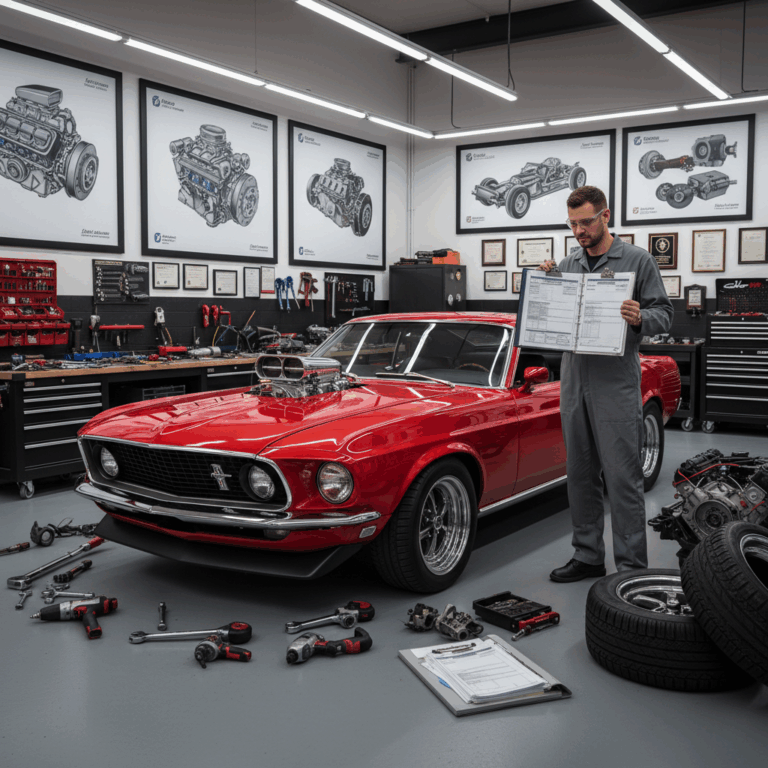Key Documents for Custom Car Builds
When building a custom car, having the right documentation is crucial to ensure legal compliance and safety on the road. Every modification must be clearly recorded and verified.
These key documents serve as proof that changes comply with regulations and help maintain the vehicle’s legal status and roadworthiness throughout its lifecycle.
Understanding the core documents involved can simplify the approval process and avoid potential issues with authorities or insurers later on.
Detailed Modification Certificate
The Detailed Modification Certificate lists all changes made to the original vehicle. It specifies each altered or installed part and explains how these affect the car’s characteristics.
This document is essential as it presents an accurate account of the custom work and assists authorities in verifying the vehicle’s new specifications.
Without this certificate, proving the nature and extent of modifications can be difficult, risking the legality of the build and its ability to be registered.
Manufacturer or Technical Responsible Documentation
A declaration of conformity is often required from the manufacturer or the technical entity responsible for the design and fabrication of the modifications.
This document confirms that the customized components and changes meet technical and safety standards, supporting the vehicle’s homologation process.
In many cases, proof of manufacturer status, such as ISO 9001 certification or a World Manufacturer Identifier (WMI) code, must be presented to validate the source of the modifications.
Approval and Certification Requirements
Custom cars must adhere to strict approval and certification rules to be legally recognized and safe for road use. These requirements vary by country but share common elements.
Meeting these standards ensures the vehicle’s components and overall modifications comply with technical and safety regulations, avoiding legal issues and enhancing safety.
Understanding these requirements helps builders navigate the approval process smoothly and maintain the vehicle’s legal and safe status.
Component and Vehicle Homologation
Homologation certifies that new or modified parts comply with current safety and technical standards. This certification is mandatory for components used in custom builds.
The entire modified vehicle must also pass homologation to verify it remains suitable for road circulation under legal safety requirements.
Failure to homologate parts or the vehicle can lead to registration problems and legal penalties, underscoring the importance of this approval step.
Technical Suitability Report
This report is often required from accredited technical labs or services to confirm the safety and compliance of the custom vehicle post-modification.
It evaluates whether the modifications maintain or improve the vehicle’s roadworthiness, especially for historic cars or extensive transformations.
Such reports provide authorities with detailed assessments that support the vehicle’s legal acceptance and safe operation on public roads.
Quality Certifications and Manufacturer Status
Certification like ISO 9001 demonstrates the manufacturer’s commitment to quality and standard compliance in producing custom parts or modifications.
Proof of manufacturer status, including official codes like the World Manufacturer Identifier (WMI), further legitimizes the source and reliability of modifications.
These certifications support the homologation process and ensure that the custom vehicle adheres to recognized safety and quality standards.
Basic Legal Documentation for Modified Vehicles
For custom cars to legally circulate, they must have the necessary legal documents reflecting their modified status. These documents vary by jurisdiction but share common foundational elements.
Proper documentation is crucial not only for legal compliance but also to ensure the vehicle is safe and insured according to local laws. Understanding these documents avoids future complications.
Maintaining updated and accurate legal documents helps the owner prove the vehicle’s legitimacy and allows smooth interactions with authorities and insurers.
Circulation Permits and Vehicle Registration
Circulation permits are mandatory legal documents allowing modified cars to operate on public roads. These must be updated to reflect the vehicle’s new specifications accurately.
Vehicle registration must include modification details in the technical record, ensuring authorities recognize the changes and the car complies with regulations.
Failing to update permits or registration can lead to fines, impoundment, or inability to legally drive the vehicle, highlighting the importance of compliance.
Vehicle Inspection and Insurance
Regular vehicle inspections verify that modifications do not compromise safety or emissions standards, certifying the vehicle remains roadworthy after changes.
Insurance policies must be updated to cover custom modifications, ensuring adequate liability and damage protection tailored to the vehicle’s altered state.
Without valid inspection certification or proper insurance, driving a modified car is illegal and risky, increasing liability for the owner in case of accidents.
Ensuring Compliance and Road Safety
Proper documentation of custom car modifications is vital to ensure that vehicles meet legal and safety standards. This protects owners and other road users by verifying compliance.
Without correct papers, vehicles risk being deemed illegal or unsafe, which can lead to fines, denied insurance claims, or even impoundment.
Documenting modifications thoroughly enables authorities to assess a vehicle’s eligibility for road use and helps maintain consistent safety practices across customized builds.
Importance of Proper Documentation
Proper documentation provides clear evidence that a custom car meets all required regulations. This reduces disputes during inspections and registration processes.
Having accurate certificates and approvals improves transparency, showing that the modifications were performed following safety and technical guidelines.
This clarity helps avoid costly delays and supports smoother interactions with licensing agencies and insurance companies.
Maintaining Legal Recognition and Safety Standards
Maintaining legal recognition of a custom car requires continuous adherence to safety standards and proper document updates after any further modifications.
Regular inspections and keeping all certifications current ensures the vehicle remains roadworthy and legally compliant.
Failing to maintain compliance can lead to revoked registration and jeopardize driver safety, highlighting the importance of proactive documentation management.







